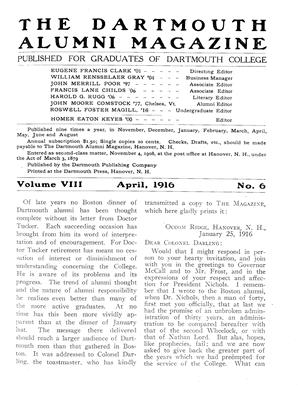During President Tucker's administration an effective committee system of faculty government was established at Dartmouth. The committee on administration which was given the function of administering the rules and regulations of the faculty was made up of the President, Dean, and four members of the faculty, each of the faculty members representing one of the college classes. They were given the name of class officers and for many years when the classes were relatively small the class representatives came into somewhat intimate relation with their respective classes. As the size of the classes increased, however, the class officers came to function, chiefly, in connection with their general duties as members of the committee on administration. It was the belief of the administration of the college that with the increased size of the entering classes more, rather than less, personal supervision was desirable. To meet this need the freshman class officer four years ago undertook to cultivate a personal relationship with the members of the freshman class which mi&ht help them to succeed in their college life. The class officer was given a room in the administration building and office hours from two to four daily were devoted to consultation with freshmen. Since 1912 regular office hours for the freshman class officer have been as fixed as those of the other administration officials.
The consultations with the freshmen are made upon a variety of subjects. Naturally that which demands most attention is the subject of scholarship. Attempts are made on the part of the class officer to discover the reasons for the failure to make good on the part of those standing lowest in the class. An endeavor is made to secure the cooperation of the student with those agencies and methods of work which are likely to promote his success. Various motives are appealed to to strengthen the student's will power and efforts are made to improve the environmental influences. While much of the time of the class officer is given to the lower fourth of the class where there is constant danger of failure to maintain college standing, considerable attention is also given to the upper fourth of the class which represents the highest scholarship. The scholastic honors of the college and the: significance to be attached to these are explained by the class officer. Lists of men possessing Phi Beta Kappa possibilities are sent to the officers of the Dartmouth chapter of Phi Beta Kappa.
The class officer endeavors to discover the vital interests of each man and his tentative choice of life work. It is not to be expected that he will be wise enough to advise all, or any considerable number, with reference to their future work; but it is possible for him through discussion of the relation of college work to post-college activities, to create in the student's mind a greater appreciation of substantive values in college. In order to give the benefit of expert advice to those planning for business, medicine, and civil engineering lists of such students are sent to the officers of the Tuck, Medical, and Thayer schools. Those departments in which certain groups of men are likely to specialize, are given the names of . such students.
The class officer is only a semi-official person and as such has a greater opportunity than the Dean in securing the confidence of the timid freshman. It is in this capacity, though less spectacular, that the real satisfaction of the class officer's work is to be found. To be able to help a boy through a moral crisis, to assist him in solving his financial difficulties, or to strengthen his determination to go through college at all hazards, these are the rewards of the class officer and the justification of his office.
 View Full Issue
View Full Issue
More From This Issue
-
 Article
ArticleANNUAL MEETING OF THE DARTMOUTH SECRETARIES ASSOCIATION
April 1916 By Gray Knapp '12 -
 Article
ArticleTHE SPIRIT AND MECHANISM OF THE ADVISOR SYSTEM
April 1916 By Charles R. Lingley -
 Article
ArticleOf late years no Boston dinner of Dartmouth
April 1916 -
 Article
ArticleCARNIVAL ELICITS COMMENT
April 1916 -
 Class Notes
Class NotesCLASS OF 1910
April 1916 By Sturgis Pishon -
 Article
ArticleMILITARY TRAINING CAMPS
April 1916








